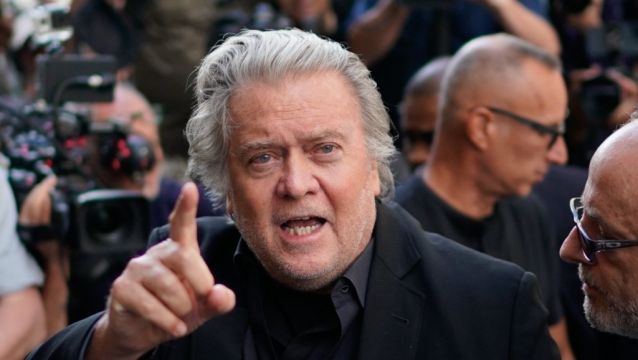Steve Bannon, a prominent figure on the American right who served as a senior strategist for former President Donald Trump, was sentenced by a judge on Friday to four months in prison for refusing to cooperate with lawmakers investigating last year's U.S. Capitol attack by a pro-Trump mob.
U.S. District Judge Carl Nichols during a sentencing hearing also ordered Bannon to pay a fine of $6,500 (€6,644).
Bannon was convicted by a jury in July on two counts of contempt of Congress for failing to provide documents or testimony. Each of the two counts was punishable by a minimum of one month and a maximum of one year in prison and a fine of up to $100,000 (€102,000).
Prosecutors on Monday had asked the judge to sentence Bannon to six months in prison, while Bannon's attorneys had sought probation.
Prosecutor J.P. Cooney said at Friday's hearing that Bannon chose to "thumb his nose at Congress." He "is not above the law, and that's what makes this case important," Cooney said.
A jury of eight men and four women convicted Bannon for refusing to testify or provide documents subpoenaed by the House of Representatives select committee probing the Jan. 6, 2021, Capitol attack and efforts by Trump's allies to overturn his 2020 election loss.
Bannon, 68, was a key adviser to the Republican Trump's 2016 presidential campaign, then served as his chief White House strategist during 2017 before a falling out between them that was later patched up. Bannon helped articulate the "America First" right-wing populism and stout opposition to immigration that helped define Trump's presidency.
Bannon has played an instrumental role in right-wing media and has promoted right-wing causes and candidates in the United States and abroad.
A pro-Trump mob stormed the Capitol and attacked police with batons, sledgehammers, flag poles, Taser devices, chemical irritants, metal pipes, rocks, metal guard rails and other weapons in a failed effort to block congressional certification of his 2020 election loss to Democrat Joe Biden.
Bannon declined to address the judge prior to sentencing on Friday.
His attorney David Schoen, in a lengthy diatribe, said Bannon relied on the advice of his lawyers not to comply with a congressional subpoena after Trump invoked executive privilege, a legal doctrine that shields some White House communications from disclosure.
"A more egregious contempt of Congress would have been to say 'Screw you Congress, take your subpoena and shove it!'" Schoen said.
According to the Jan. 6 committee, Bannon spoke with Trump at least twice on the day before the attack, attended a planning meeting at a Washington hotel and said on his right-wing podcast that "all hell is going to break loose tomorrow."
In his trial, prosecutors called only two witnesses while Bannon's defense team called none. Bannon opted not to testify. Bannon's lawyers have said they will appeal his conviction.
Bannon's defense was hamstrung by rulings by Nichols that barred him from asserting that he relied on executive privilege claims and arguing that he relied on advice from his attorney.
The committee's leaders have called Bannon's conviction a victory for the rule of law. Bannon had sought to portray the criminal charges as politically motivated, lashing out at Biden and Attorney General Merrick Garland, while saying, "They took on the wrong guy his time."
The Democratic-led committee has sought testimony from dozens of people in Trump's orbit. In addition to Bannon, prosecutors have charged former Trump White House adviser Peter Navarro with contempt of Congress for defying a subpoena from the same committee, with a Nov. 17 trial date set. Navarro has pleaded not guilty.
Friday's sentencing does not end Bannon's legal troubles.
He was indicted in New York state in September on charges of money laundering and conspiracy, with prosecutors accusing him of deceiving donors giving money to help build Trump's promised wall along the U.S.-Mexico border. Bannon, who pleaded not guilty, could face up to 15 years in prison if convicted on those charges.
Trump pardoned Bannon last year on similar federal charges.







